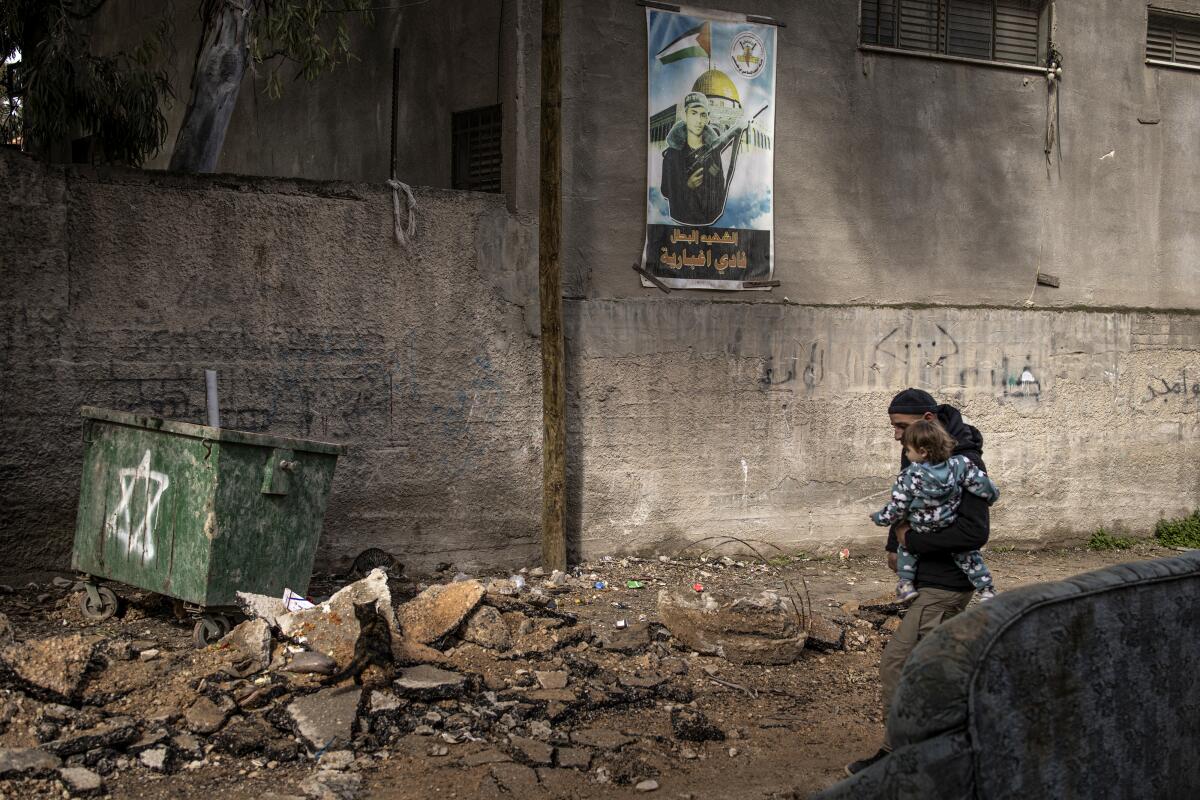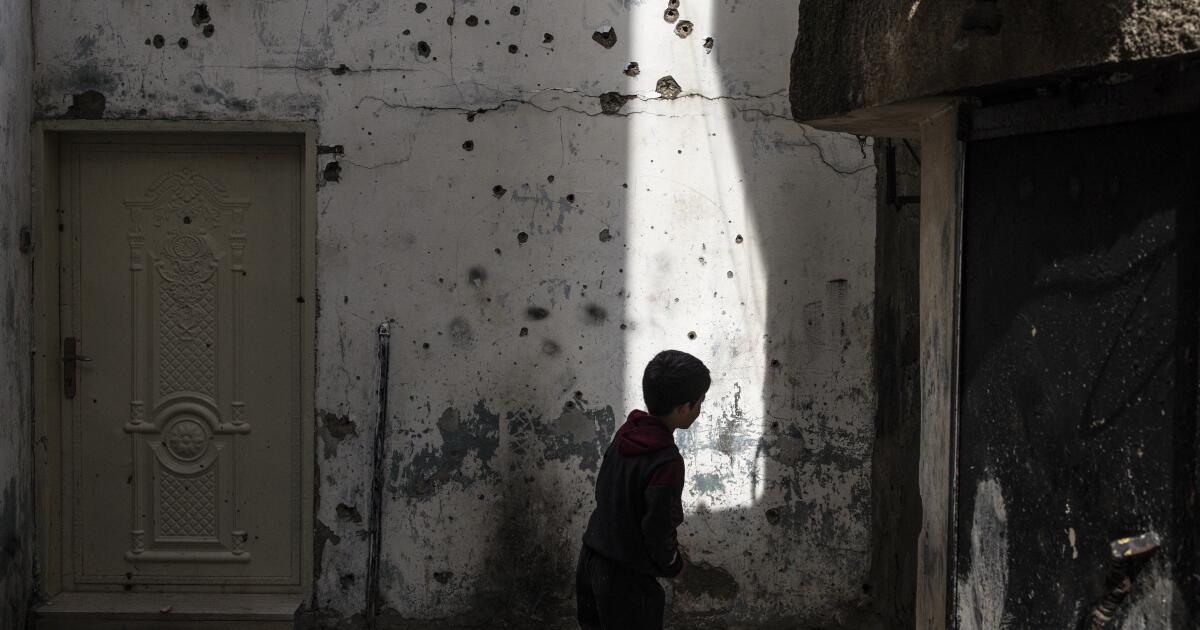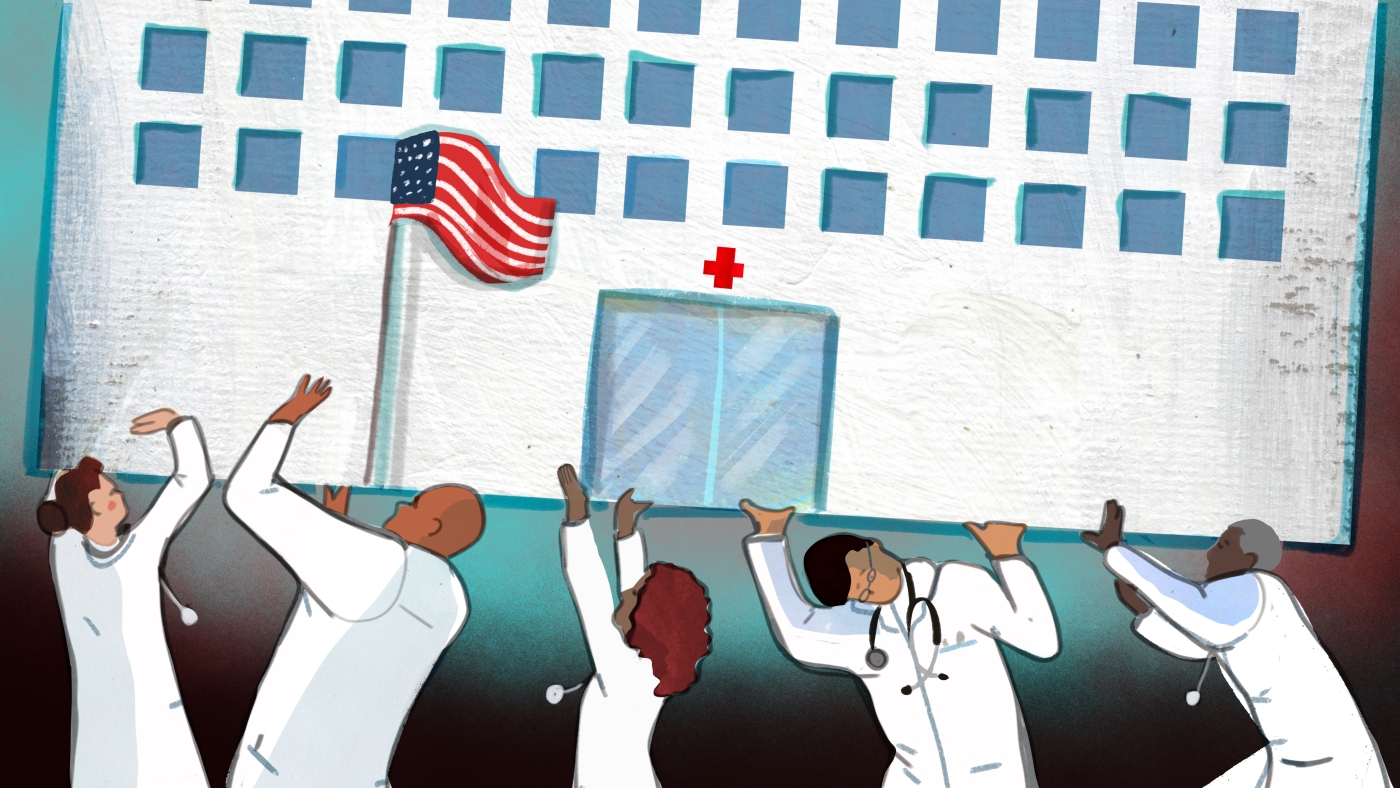JENIN, West Bank – After 15 months in an Israeli prison, Mustafa Sheta went home with his brothers to Jenin. They say a lot has changed during his time in prison.
Fighters who once engaged in daily firefights with Israeli soldiers? Left. The bustling refugee camp population that gave Jenin its reputation as the capital of martyrs? Left. The camp housed Sheta's theater, which he transformed into a world-famous beacon of Palestinian cultural resistance? Left.
It turned out that Jenin, known as the city that never gave up, had surrendered.
“I was shocked. The concept of sustainability in Jenin is really important to the people. Where are the militants, the Palestinian Authority, the grassroots organizations, the local leaders?” – Sheta said.
“It felt like we had lost the war, like we were losing this battle.”
A May view of Palestinian homes destroyed by the Israeli army in Nur Shams, one of three refugee camps in the northern West Bank attacked by the Israeli military.
(Wahaj Bani Mufle/AFP/Getty)
Jenin was a quintessential example of how Israel – in a long campaign called Operation Iron Wall – largely subjugated the northern West Bank.
For more than 300 days, Israel deployed soldiers, tanks, helicopter gunships and even carried out airstrikes in Jenin and other cities, leaving a trail of destruction that triggered what aid groups call the worst wave of Palestinian displacement in the West Bank – initially more than 40,000 people, now down to about 32,000 – since Israel occupied the region in 1967. In a report published on November 20, Human Rights Watch argued that the actions of Israeli forces amounted to: war crimes and crimes against humanity.
Israel is particularly angry about refugee camps in the area, set up as tent camps for Palestinians displaced by Israel's creation in 1948, but which over decades have become slum areas that Israel views as hotbeds of militancy.
Three of them – the Jenin, Tulkarm and Nur Shams camps – have been deserted and almost occupied by the Israeli military for about nine months, with soldiers systematically demolishing houses.
Of these, the Jenin camp, which has legendary status among Palestinians after a 10-day battle between militants and Israeli forces in 2002, has seen the worst of it, suffering destruction that many here compare to the Gaza Strip.
For Palestinians, who saw the camp and the surrounding city of Jenin as a symbol of resistance to occupation, it exemplified a sense of despair and weariness from a struggle that had never seemed so fruitless in creating a Palestinian state.
Sheta, the theater's general director, staged works on political themes until he was detained – without charge, he said – from December 2023 to March this year. The Liberty Theater became famous for producing such works as George Orwell's Animal Farm and Palestinian writer Ghassan Kanafani's Men in the Sun, a tragic novel about three men fleeing refugee camps.
Although the theater has regrouped in another place, it is no longer the same. “We believe that the theater has been seized by the Israeli army because we cannot be in the camp,” he said. “Our soul is there.”
Using satellite data from October, the United Nations estimates that more than half of the camp's buildings – nearly 700 structures – have been destroyed or damaged, and entire residential areas have been demolished or blown up. Several streets were destroyed or blocked by 29 embankments erected by Israeli forces; many other streets were widened by bulldozers to create corridors intended to facilitate future military operations.

A Palestinian woman walks past a wall riddled with bullet holes in the Jenin camp in February. Over the past months, the camp has been deserted.
(John Wessels/AFP/Getty Images)
The Israeli military says its operation in the camps is aimed at eliminating militant infrastructure, including explosives factories, weapons caches and tunnels. It also seeks to root out groups such as the Jenin Battalion, a loose alliance of militants from various factions including Fatah, Hamas and Palestinian Islamic Jihad.
The Jenin battalion primarily fought Israeli forces but also clashed with the Palestinian Authority, which controls the West Bank and cooperates with Israel on security matters; many Palestinians view the government as corrupt and powerless.
But whatever resistance there was in the camp was crushed soon after the operation began in January, residents and Palestinian officials say, leaving Israel's ongoing occupation a mystery for the estimated 14,000 people who were expelled and who have no idea when or whether they will be allowed to return.
“The Jenin battalion is gone. Not a single one is alive. They killed them one by one,” said Shadi Dabaya, 54, sitting among a group of men at the main entrance to the Jenin camp. They fell silent as an Israeli armored vehicle drove by, its antenna swinging over the embankment blocking the street.

Israeli soldiers follow a tank at a Palestinian refugee camp in Jenin in February. Several months later, the Israeli military blocked access to the camp.
(John Wessels/AFP/Getty Images)
“We just hear them shooting all the time,” Dabaiya said, nodding toward the Israelis. “They turned the camp into a training ground.”
No local residents were allowed to visit the house, Dabaya added. In September, Israeli soldiers shot and killed two 14-year-old boys as they tried to sneak into the camp to retrieve some of their belongings. The Israeli military told the media that the boys approached the soldiers – “posing a threat to them” – and disobeyed orders to stay away; it says the shooting is under investigation.
“Despite all the destruction, even if the Israelis leave the camp tonight, it will take us months to live there – all the infrastructure has been destroyed,” said Mohammed Al-Sabbah, who heads the camp's People's Services Committee.
For now, he said, families are crammed into a block of 20 buildings with one-room student dormitories about six miles from the camp. But months after they moved there, the Palestinian Authority, from which Israel withholds tax revenue and has taken other measures that have strangled its finances, is unable to pay the $63,000 monthly rent.
“Those who accepted these terrible conditions – crammed with their families in a tiny room meant for one student – even they will end up on the streets,” Al-Sabbah said.
The worst part, he added, was that he had no idea whether his house was still standing.
“If we knew what the Israelis were doing, we could at least figure out what to do ourselves.”
The Jenin operation spread its influence far beyond the camp. Israeli soldiers who once roamed surrounding city streets in armored vehicles fearing attacks now patrol unhindered almost daily, raiding shops and homes at will, residents say.
The areas adjacent to the camp were also deserted. So far, 1,500 residents have been forced to leave the areas, according to a Palestinian Authority official who spoke on condition of anonymity for security reasons.
“These people have nothing to do with the camp, but they were kicked out,” he said.
One of the affected areas is Jabriyat, a wealthy area overlooking the camp that resembles a ghost town, where villas have a dusty patina of abandonment.
“All of us who live around the camp are paying for this,” said Hiba Jarrar, one of the last residents on her street in Jabriat. From her balcony, she pointed to a building that had recently been requisitioned by Israeli soldiers.
“There is no resistance, zero. The Palestinians don't fire a single bullet. A soldier can raid any house on his own because he feels safe,” she said, adding that when she heard gunfire in the past, she assumed Palestinians and Israelis were fighting; she now knows that it only comes from Israeli soldiers.
– You know what's sad? she said. “If anyone was fighting the Israelis now, the people here would tell them to stop. They just want to live. They are desperate.”

A Palestinian man carries a child along a road destroyed by Israeli troops during a large-scale military operation in the eastern city of Jenin, which is located near the Jenin refugee camp.
(John Wessels/AFP/Getty Images)
Palestinian officials say that despite repeated requests, Israeli authorities have not indicated when they will leave the camp and all attempts to facilitate visits to the camp have been rejected.
“What happens in the camp is not a necessary security prerogative. Nothing requires the Israelis to do what they are doing,” said Palestinian Authority security spokesman Brig. General Anwar Rajab added that his forces could provide security and that Israel's actions were undermining their authority.
Rajab echoed the sentiments of residents, analysts and aid workers who see the Israeli attack as a larger plan to turn the camps into regular urban areas rather than refugee shelters. Such a rebranding would essentially erase the idea of Palestinians as refugees.
“They target a community by changing the topography of the area,” said Roland Friedrich, director of West Bank relations for UNRWA, the UN agency for Palestinian refugees. He added that Israeli officials in local media said that after Operation Iron Wall ends, “the refugee problem will no longer have a geographical expression.”
Another measure in the same vein, according to a Palestinian Authority official who spoke on condition of anonymity for security reasons, is Israel's refusal to allow UNRWA to return to the camp.
Among those hoping to someday return is Sheta, who, after being released from detention, walked to the mound at the entrance to the camp – the closest theater he could find to his home, which was founded in 2006 by a former Palestinian militant from Jenin named Zakaria Zubeidi, along with a left-wing Israeli actor and a Swedish activist.
According to him, his imprisonment was a time of routine beatings and humiliation: soldiers searched detainees, recorded them on their phones and abused them. Israelis considered Palestinians “not even human. And not even animals. Less than nothing,” he said.
He has since “returned to use the same tools” he used before his arrest to resist the Israeli occupation, but he acknowledged that the people of Jenin have changed. “They have different priorities. Some have lost confidence in the Palestinian cause,” he said.
Some in the community considered him “crazy” for worrying about nonviolent methods. But “if you lose your cultural front, you lose your identity, your heritage, your roots in this land,” he said. Besides, he added with a weary smile, if his methods were not effective, then why did the Israelis arrest him?
“At least it proves that my work annoys them, doesn’t it?”


_VqYPkAw.jpg?width=1200&height=630&fit=crop&enable=upscale&auto=webp&w=150&resize=150,150&ssl=1)




